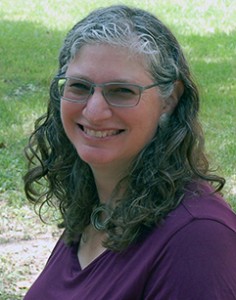 Computer science Ph.D. alumnae Risa Myers chose Rice for her graduate student work because professor Chris Jermaine’s research area aligned well with her own interests. “He let me find my own data and pursue research in my particular area of interest (clinical outcomes) and helped me publish my work in both computer science and medical venues,” she said. “I’m fortunate to have found advisers and collaborators that have really helped me do what I set out to do. I came here to learn how to make sense out of biomedical data and that is what I was able to do.”
Computer science Ph.D. alumnae Risa Myers chose Rice for her graduate student work because professor Chris Jermaine’s research area aligned well with her own interests. “He let me find my own data and pursue research in my particular area of interest (clinical outcomes) and helped me publish my work in both computer science and medical venues,” she said. “I’m fortunate to have found advisers and collaborators that have really helped me do what I set out to do. I came here to learn how to make sense out of biomedical data and that is what I was able to do.”
Myers works as a Data Scientist for Methodist Hospital, returning to the healthcare industry after a six-year break to earn her Ph.D. She’d already built a successful career when she decided to change her focus. “I was working in the IT department at M.D. Anderson, creating a data warehouse when I realized I didn’t want to build it, I wanted to use it,” she said. “But to sit at the [research] table with doctors, I’d have to have a Ph.D.”
So Myers traded full-time employment for full-time graduate work. “My biggest challenge was that I was rusty,” she said. Her previous degrees from MIT and Stanford had been in computer science, but she felt the need to get back up to speed in math. “I took STAT 310 as a grad student because I felt I needed a formal refresher,” said Myers.
Her determination to thoroughly understand all the material in every course was revealed in her GPA upon graduation, a 3.89 on a 4.0 scale. But Myers was equally passionate about helping other students master CS concepts. As the head teaching assistant for COMP 182 in the first semester it was offered, she was a critical component of the course’s success. “Myers helped to organize and oversee the work of the large number of undergraduate staff for the course,” said Scott Rixner, professor of computer science at Rice. “This was immensely helpful as we developed an innovative new introductory class for a large number of students with a large teaching staff. Without her, it would have been more difficult to launch the course as successfully as we did.”
She returned two years later as head TA for the course when the professors transitioned much of the material to Coursera, a massively open online course (MOOC) platform, and she continued mentoring undergraduate students even when they took courses for which she was not their TA. Myers’ career experience made her a perfect mentor for other graduate students as well, and guided so many of her colleagues that she became affectionately known as the mentor for all the grad students.
When she felt buried under her research, she volunteered as a bartender at Valhalla, Rice’s famous graduate student bar. “It helped me stay sane,” she said, “and I realized how important it was to get out and talk with other people.” To prompt her CS peers to leave their offices, Myers organized a department-wide Halloween scavenger hunt that jammed the corridors. “People were talking to people they’d seen in the building for years but never met or talked with,” she said.
While Myers was studying, mentoring, and encouraging, she was also diving deep into her research and won several awards, including the first place award in the Association for Computing Machinery Student Research Competition at the Grace Hopper Celebration of Women. She said, “My research was on real problems and that appealed to people. I was really enthusiastic about it and I communicated well.”
 Myers is still enthusiastic about her research and her work applying machine learning to healthcare. She said, “As we continue to collect more and more patient data, we have the opportunity to use it to improve care, reduce costs, better understand disease and predict clinical outcomes. The Data Scientist role is fairly new at hospitals, but the potential for impact is huge.”
Myers is still enthusiastic about her research and her work applying machine learning to healthcare. She said, “As we continue to collect more and more patient data, we have the opportunity to use it to improve care, reduce costs, better understand disease and predict clinical outcomes. The Data Scientist role is fairly new at hospitals, but the potential for impact is huge.”
Risa Myers completed her M.S. in CS in 2013 and her Ph.D in 2016. Her adviser was Chris Jermaine.
In 2017, Myers was been invited to return to Rice as part of the university’s Data Science Initiative. She is now a full-time lecturer in the Computer Science department and teaches both data science and database courses.
